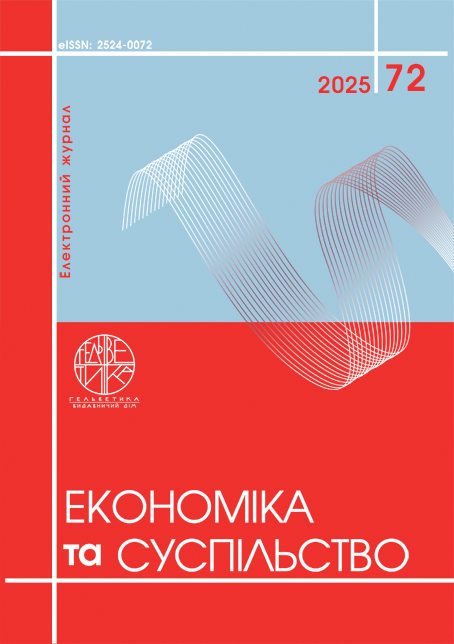THE IMPACT OF ADVERTISING AND DIGITAL COMMUNICATIONS ON BRAND TRUST
Abstract
The article researches the impact of advertising and digital communications on brand trust. It is found that a significant share of communication strategies is shifting towards digital technologies, which ensures contact that is more effective with consumers. It is noted that advertising and digital communications are important tools for building brand trust, because in the modern information space, where competition between companies is growing, the effective use of marketing strategies helps businesses to connect with the target audience, create a positive image and maintain consumer loyalty. It has been established that the effectiveness of advertising and digital communications depends on the transparency, authenticity, and responsibility of the company in its interaction with the audience. To successfully promote a brand, it is important not only to attract the attention of consumers but also to create long-term relationships based on trust, openness and quality of the product or service. In order to increase the effectiveness of marketing communication mix in forming and maintaining brand trust, strengthening the company’s image and increasing its competitiveness, the author offers recommendations for an effective combination of traditional and digital communication tools. The advantages and disadvantages of using advertising and digital communications in forming brand trust are systematized and considered. The information environment requires brands not only to use effective advertising, but also to use digital communications strategically to form consumer trust. The synergy of these two elements plays a key role in forming a sustainable relationship between a brand and its audience. It is noted that the mechanisms of influence of advertising and digital communication channels on the formation of brand trust are realized through transparency in crisis situations, personalization of content, consumer engagement through interactivity, stability and long-term communication, optimal distribution of traditional and digital tools in the communication strategy, which allows reaching a wider range of audience and increasing the effectiveness of communication, and ensuring sustainable brand development.
References
Васильченко Л. С. Вплив маркетингового комунікаційного середовища підприємства на формування поведінки споживача. Підприємництво та інновації. 2019. Вип. 9. С. 66–69.
Горохова Т. В. Вплив розвитку цифрових технологій на поведінку споживачів. Вісник аграрної науки Причорномор’я. 2021. Вип. 4. С. 45–54.
Капінус Л. В. Вплив соціальних мереж на маркетингову поведінку підприємства на онлайн-ринку. Таврійський науковий вісник. Серія «Економіка». 2023. Вип. 18. С. 86–93.
Осокін М., Осокіна А. Цифрові комунікації в системі управління бізнесом. Економіка та суспільство. 2024. №64. URL: https://doi.org/10.32782/2524-0072/2024-64-31 (дата звернення: 07.03.2025).
Ромат Є.В. Маркетингові комунікації: підручник. Київ: Студцентр, 2022. 336 с.
Стрій Л. О., Захарченко Л. А. Маркетинг електронних комунікацій в умовах цифрової економіки. Цифрова економіка та економічна безпека. 2023. Вип. 4 (04). С. 9–14.
Стрій Л. О., Чукурна О. П., Бондаренко О. М. Віртуальний маркетинг в комунікаціях. Інфраструктура ринку. 2023. Вип. 70. С. 27–32.
Ярмолюк О. Я., Фісун Ю. В., Шаповалова А. А. Соціальні мережі як сучасний інструмент просування. Підприємництво та інновації. 2020. № 11-2. С. 62–65.
Cristafovici P. The Impact of Digital Transformations on Consumer Behavior. Management Strategies and Policies in the Contemporary Economy. 2023. Vol. 8. P. 371–375.
Vasylchenko L.S. (2019). The influence of the marketing communication environment of the enterprise on the formation of consumer behavior. Entrepreneurship and Innovation, 9, 66-69 [in Ukrainian].
Horokhova T.V. (2021). The impact of digital technology development on consumer behavior. Bulletin of Agricultural Science of the Black Sea Region. 4, 45-54 [in Ukrainian].
Kapinus L.V. (2023). The influence of social networks on the marketing behavior of enterprises in the online market. Tavria Scientific Bulletin. Series «Economy», 18, 86-93 [in Ukrainian].
Osokin M., Osokina A. (2024). Digital communications in the business management system. Economy and Society, 64. URL: https://doi.org/10.32782/2524-0072/2024-64-31 (access date: 07.03.2025) [in Ukrainian].
Romat Ye.V. (2022). Marketing Communications: Textbook. Kyiv: Studtsentr [in Ukrainian].
Strii L.O., Zakharchenko L.A. (2023). Marketing of electronic communications in the digital economy. Digital economy and economic security, 4 (04), 9-14 [in Ukrainian].
Strii L.O., Chukurna O.Р., Bondarenko O.M. (2023). Virtual Marketing in Communications. Market Infrastructure, 70, 27-32 [in Ukrainian].
Iarmoliuk O.Ya., Fisun Yu.V., Shapovalova A.A. (2020). Social networks as a modern tool for promotion. Entrepreneurship and Innovation, 11-2, 62-65. [in Ukrainian].
Cristafovici P. The Impact of Digital Transformations on Consumer Behavior. Management Strategies and Policies in the Contemporary Economy. 2023. Vol. 8. P. 371–375.

This work is licensed under a Creative Commons Attribution 4.0 International License.


